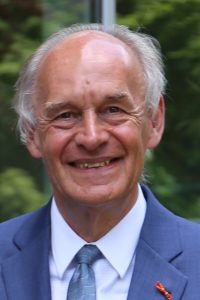 Stephen Clark is Emeritus Professor of Philosophy at University of Liverpool. We invited him to discuss comparative philosophy of religion as part of our “Philosophers of Religion on Philosophy of Religion” series.
Stephen Clark is Emeritus Professor of Philosophy at University of Liverpool. We invited him to discuss comparative philosophy of religion as part of our “Philosophers of Religion on Philosophy of Religion” series.
Before religions, or religion, can be compared we need to have some notion of what counts as a religion, or what religion is. Religions have sometimes been identified as systems of belief and practice which make some reference to entities or powers that are more than “natural,” or that lack ordinarily “empirical” proofs. But this may be giving more credit to “intellectuals” than they deserve: the great mass of people engaged with any “religion” may have little interest in any system of belief, and even take the regular practice of their “religion” more casually than the supposed beliefs require. How many professed Christians really – in daily practice – act as if they expected their every choice to guide them towards or away from Heaven, or as if the loss of their lives, their health, their family, their property was of no real importance? “I may say quite firmly that if those things the loss of which you complain of were really yours, you would never have lost them.”1 But even Boethius needed to be imprisoned and awaiting execution before the thought occurred to him. And how many who sacrificed to the effigy of an Emperor really “believed” that the Emperor was “a god” (whatever a god might be)? Nor are even the most organized and well-defined “religions” ever as homogeneous or as distinct as inquisitors might wish: symbols and stories and ceremonial dress are shared across their boundaries, and even creeds are often consciously, contentiously obscure. Some religions, as commonly understood, are rather aggregated from diverse practice and doctrine, for the benefit (chiefly) of intrusive missionaries who wanted a clearly defined opponent: has there ever “really” been a religion rightly described as “Hinduism” any more than those called “Hellenism” or “Modernism”?
Is there anything better to be said simply of “religion”? We need not suppose that there are many, or any, discrete and well-defined systems of belief or ceremonial practice of the sort that are called “religions,” even if the category is sometimes useful to bureaucrats. Maybe it helps, sometimes, to have some rough estimate of how many patients will, or won’t, eat pork or beef or horse-meat. Maybe it helps to know what days of the week or year employees or school children will need as holy days: “holy,” as being set aside from ordinary employment, as some might also set some building or patch of land aside from ordinary exploitation. Is that perhaps an answer? “Religion,” whatever its particular manifestation, is the practice of setting something aside from ordinarily practical uses. None of us find every possible food acceptable, and our dietary choices – which need not reflect our individual taste – reveal our “religious” loyalty, even if we don’t consciously understand that such barriers are “religious,” that there is no merely “medical” reason not to eat pigs or dogs or roaches. None of us will gladly exploit everything that might be of some use. Nor do we even willingly think of everything – children or the family dog – as an available asset. Just what those limits may be, on food or use or time, will vary across the nations and the years, but the common thread is that some things are “holy.” Some people, even some peoples, identify that “holy” precisely and explicitly: they keep Sabbath, eat only what is “kosher” or “halal,” and abide by other sexual and ceremonial laws. Other people, or peoples, practice a looser life – but even they will mostly acknowledge limits, sometimes rationalizing their obedience by speaking of moral or medical harms.
This notion – of some things being “set aside” from “natural” life – may also indicate a breach in “nature”: the very act of setting aside a building, a wood, a stream, suggests that another world than ours is intruding there. Abbot Suger, the architect of the Abbey of St Denis, reported that, when in the church he saw himself “dwelling in some strange region of the universe which neither exists entirely in the slime of earth nor entirely in the purity of heaven, and that by the grace of God, [he could] be transported from this inferior to that higher world in an anagogical manner.”2 Theatres, in their first beginnings in Greece or China or India, were also places where the “other world” was manifest, complete with “gods” and “heroes” – and even “secular” audiences in the apparently modern world are similarly “entranced,” caught up in the action, even instilled with some lasting sense of human or more-than-human life. What will our descendants, long after Armageddon, think of common devotion to Sherlock Holmes or Superman? Once upon a time the Olympic Games, and other “sporting events,” were also acknowledged as the gods’ domain, occasions for the display of extraordinary talent – which was to say, of a god. So St. Augustine, in a sermon in 404 AD, gave voice to a learned defender of pagan worship: “When I worship Mercury,” we are to suppose his saying, “I worship talent. Talent cannot be seen; it is something invisible.”3 Without such gods, we are bereft: “a shadow’s dream is man, but when (a) god sheds a brightness, shining light is on earth and life is as sweet as honey.”4
Religion, then, is separate from the everyday – or rather, it is an attempt to find the marvellous even in or alongside the everyday. We cannot always be seeing things as marvellous, nor setting them aside as holy. Even the most devoted pilgrim must reckon with sore feet, and hunger, and the misunderstandings of his peers. That may apply especially in those times and places when “the divine” is conceived as “God the Omnipotent, Omniscient, Omnipresent”:
Pure faith indeed—you know not what you ask!
Naked belief in God the Omnipotent,
Omniscient, Omnipresent, sears too much
The sense of conscious creatures to be borne
It were the seeing him, no flesh shall dare.5
But the same hesitation may be found even in “polytheistic” or “animistic” cults: Semele’s request to see her lover, Zeus, “in his true form” had a disastrous end – and only her son, His son, was saved from the fire.6 In Apuleius’ story Psyche (which is Soul) was given in marriage to a god (or demon) who visited her only in the dark. Her envious sisters persuaded her to light a lamp to see who her husband was, and wax from the lamp woke him: he was, it turns out, Eros, the god of love. He fled, abandoning Psyche, who was only reunited with him, after long and difficult labours imposed by Eros’ mother Aphrodite.7 Seeing God or gods is dangerous, or at least disconcerting! And the same applies even to the thought of “galaxies like grains of sand,” spread over many billion light years.
Is this to ignore the “cosmogonical” aspect of “religious” thought and feeling? Not entirely. Consider the congruence of the current cosmogonical model, “the Big Bang,” and early stories of the very first thing to emerge, somehow, from Nothing: namely the Egyptian story of Atum’s beginning. Atum appears from the primeval ocean, Nun, and produces Up and Down, the Hot and Dry, as offspring. From these in turn arise the Million Things. All things will in the end be absorbed again in Nun, and – perhaps – the cycle will begin again, very much as current cosmologists have it. It is easy enough to claim that the Egyptian story is only imaginative fiction, and the current model is confirmed by observation (of the Big Bang’s afterglow). It is also easy to say that Atum was also – though not consistently – an object of veneration, whereas the Singularity at our beginning was only a simple fact. Both Atum and that Singularity are, in their separate ways, strictly supernatural entities – not bound by the familiar laws they themselves engendered; but that must seem, to moderns, only a sort of pun! And yet it is not absurd to acknowledge the mere feeling of cosmic unity that both stories seem to support. The Big Bang is not an event far-off, but is as close to one place as to any other. It is manifest in every cell and atom of our bodies, through aeons of stellar birth and death: we are literally star-dust – and may sometimes make that thought real to ourselves through art or poetry. A sort of “pantheistic” religiosity seems almost required by physics!
One further gloss: “the Egyptians lived in a universe composed not of things, but of beings.”8 Allen goes on to say that the “we have divorced philosophy, as a discipline, from religion. In the former we appreciate reality objectively, as something capable of study; in the latter we understand it subjectively, as something that can only be experienced. This dichotomy did not govern ancient Near Eastern thought. To it, all appreciation of reality was subjective – ‘I-Thou’ rather than ‘I-It.’”9 And it is this insight that perhaps identifies “religion,” and also suggests what is most strange in the modern “secular” outlook. Our only actual experience of the world is exactly that: experience. And yet we have somehow imagined into being a strange world devoid of any merely “subjective” or “secondary” qualities, and then been puzzled how such a merely “material” world could ever engender those same phenomenal qualities, and our experience of them. The modern “materialist” has to exercise a moral discipline as harsh as any more obviously “spiritual” practice, seeking to see the world “objectively,” and with cautious awareness of a cosmos radically other than our human home. The paradoxical conclusion is that the world of our experience – both our usual and our elevated or “god-inspired” experience – is the world there is, and it is full, as Thales said, of gods.10 What those gods may be, and how we may remember them, is the enterprise of religion.
1. Boethius The Theological Tractates. Trans., Hugh Fraser Stewart & S.J.Tester (Cambridge, Mass: Loeb Classical Library, Harvard University Press, 2011), pp.181-3: Consolation of Philosophy 2.2)
2. Erwin Panofsky, ed., Abbot Suger on the Abbey Church of St.-Denis. Ed., Gerda Panofsky-Soergel (New Jersey: Princeton University Press, 1979 [1946]), pp.21, 65.
3. Augustine, Sermon 26.24, cited by Clifford Ando, The Matter of the Gods: Religion and the Roman Empire. (Berkeley: University of California Press, 2008), p.41.
4. Pindar, Pythian 8.95-7.
5. Robert Browning, Poems 1833-65 (London: Cassell & Co., 1907), p.436. “Bishop Blougram’s Apology”, lines 637-41:
6. Ovid, Metamorphoses 3.256ff.
7. Apuleius, Metamorphoses, or The Golden Ass, Bk.5.
8. J.P.Allen, Genesis in Egypt: the Philosophy of Ancient Egyptian Creation Accounts (New Haven: Yale University Press, 1988), p.8
9. Allen, ibid. p.9.
10. Aristotle, De Anima 1.411a7–9.



